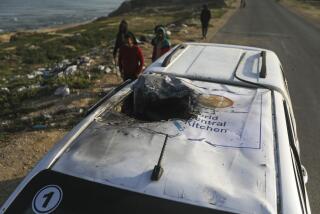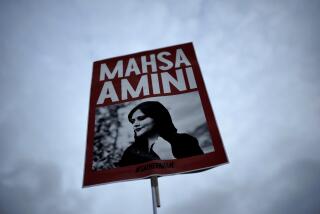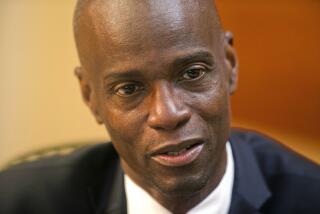Hariri slaying inquiry says calls pointed to Hezbollah
International jurists Wednesday released details of how an analysis of cellphone calls led investigators to conclude the Shiite Muslim militia Hezbollah was behind the assassination of former Lebanese Prime Minister Rafik Hariri six years ago.
The unsealing of the 47-page indictment, which suggests a complicated three-month plot by at least 11 conspirators to trail Hariri for months, establish his travel patterns and then dispatch a suicide bomber with a van full of explosives to kill him, did not produce surprises for close observers of the investigation and was immediately criticized by Hezbollah.
The inquiry of Hariri’s Feb. 14, 2005, slaying has been beset by a series of leaks to media that have caused even opponents of Hezbollah to question the integrity of the Special Tribunal for Lebanon, the U.N.-backed special court investigating the case.
Hezbollah leader Sheik Hassan Nasrallah, who last year said that the tribunal would probably indict four of his loyalists, has argued that the evidence was forged by Israeli spies who had infiltrated the country’s telecommunications industry. On Wednesday, he called the indictment part of a conspiracy to weaken the country.
Nasrallah also said the indictment was intended to sour relations between Shiites and the Sunni community Hariri led and to harm the self-described resistance to U.S. and Israeli domination of the region.
“What’s happening now is an attempt at undermining and sabotaging the social fabric, paving the ground for wars and civil strife, dragging the resistance into civil strife and consequently striking the resistance and harming its credibility,” he said in a speech broadcast live in Lebanon and across the Arab world. “This indictment only boosts our confidence today that what is happening is a high level of injustice and politicization and these honorable members of the resistance should not even be described as accused.”
Hariri’s son, former Prime Minister Saad Hariri, called on Hezbollah to hand the four accused men over to the tribunal. Nasrallah has repeatedly said he won’t do so.
Analysts say Hezbollah has deftly managed to lessen the damage the allegations might have caused to its reputation as a champion of the Arab cause, though it has suffered regionally as a result of the case.
“They’ve been out in front of this story for a long time,” said Elias Muhanna, a Harvard University researcher and author of the Middle East blog Qifa Nabki.
Though the indictment shows the mechanics of Hezbollah members’ alleged involvement in the killing, it does not explore the question of motive: why Hezbollah would want to kill a man with whom it long had warm relations.
But the investigation is something of a milestone, as it is the first time the United Nations has pursued a terrorism case. Muhanna also said more evidence could be brought to public attention, including legwork that connected a series of networks of cellphone users to higher-level Hezbollah figures and allegations in a Canadian Broadcasting Corp. report last year connecting a senior member of Hariri’s entourage to the alleged killers.
The massive explosion along Beirut’s waterfront that claimed Hariri’s life also killed more than 20 others. The indictment alleges that two of the suspected team members, in touch with the alleged ringleader Mustafa Badreddine, contacted Reuters and Al Jazeera after the attack to claim responsibility for the bombing by a fictitious group called Victory and Jihad in Greater Syria.
The indictment included an analysis of cellphone calls placed in the vicinity of the bombing scene. It established the presence of several networks of people who used fake names and remained in contact with one another exclusively until the day of the bombing, when they were in frequent contact with each other.
More to Read
Start your day right
Sign up for Essential California for news, features and recommendations from the L.A. Times and beyond in your inbox six days a week.
You may occasionally receive promotional content from the Los Angeles Times.






